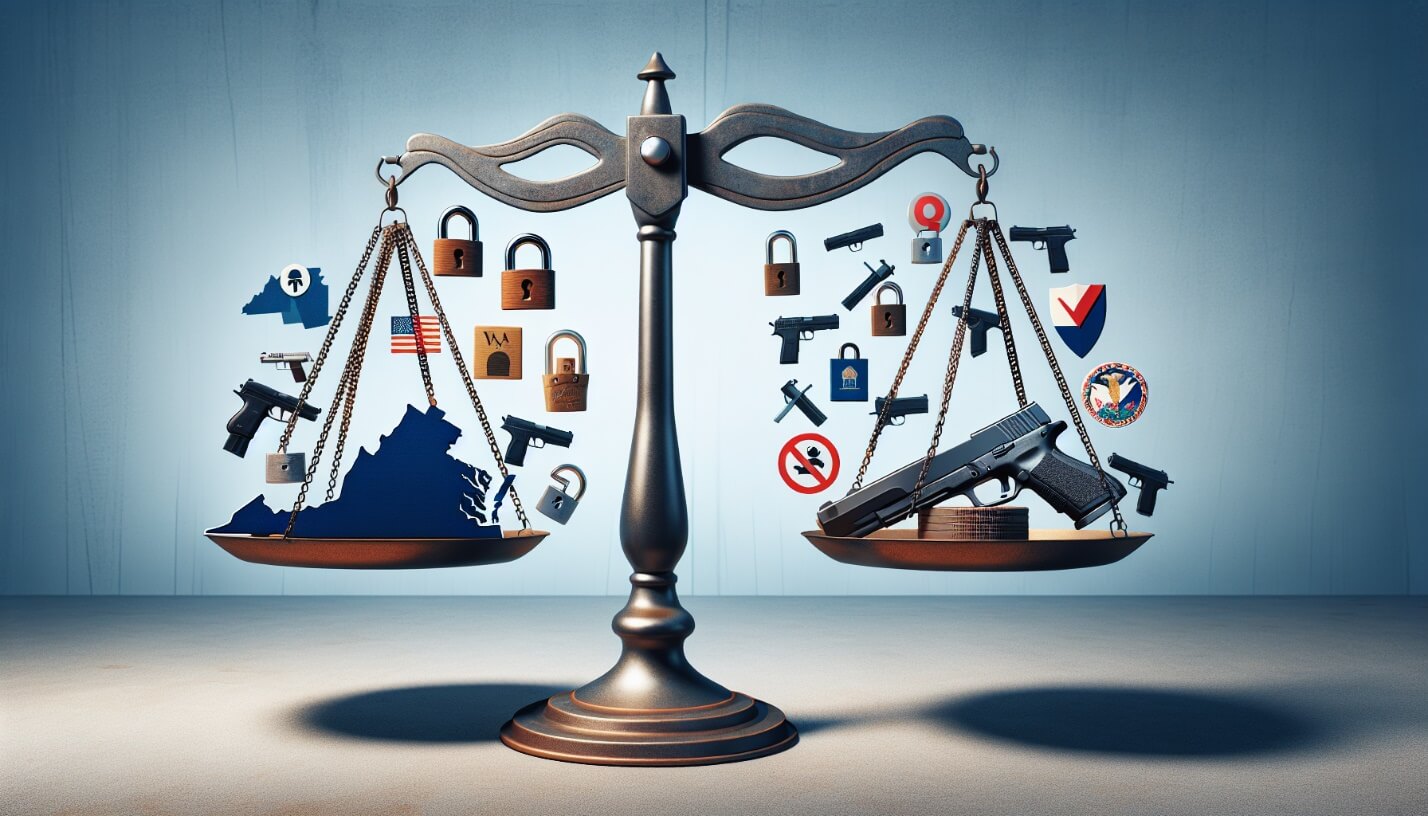Laws and Procedures
If you’re looking to legally carry a concealed weapon in Virginia, you’ll need to navigate through specific state laws and application steps. This article provides a no-nonsense overview of the process, from training to permits, helping you understand the essentials for lawful concealed carry in Virginia.
Key Takeaways
- Virginia requires individuals to obtain a specific concealed handgun permit to carry a concealed weapon, which involves completing a state-approved firearm training course and passing a background check.
- There are exceptions and location restrictions within Virginia’s concealed handgun laws; for example, law enforcement officers may not require a permit, and carrying concealed weapons is prohibited in certain places like schools and government buildings.
- Virginia has reciprocity agreements allowing the recognition of concealed handgun permits from other states, but permit holders must comply with Virginia’s laws when in the state, and penalties for violating concealed carry laws can be severe, including possible jail time and fines.
Understanding Virginia's Concealed Handgun Laws

Virginia’s concealed handgun laws carefully strike a balance between the right to self-defense and public safety. Possessing a valid concealed handgun permit is mandatory for carrying a concealed handgun, and obtaining this permit entails completing a specific firearms training course. This course delves into Virginia’s state firearms law, self-defense law, and locations where concealed carry is either allowed or banned.
Definition of a Concealed Handgun
In the Virginian context, a concealed handgun is any pistol, revolver, or other firearm, sans a machine gun, that can fire a projectile when held in one hand. The handgun is considered concealed if it is hidden from common observation, meaning its appearance is deceptive enough to conceal its true nature.
This such deceptive appearance ensures the handgun may not be easily identified as a weapon by an average person due to its concealment or the manner in which it is carried, such a manner that it remains hidden from view. The use of such weapons poses a significant challenge for law enforcement.
Permit Requirements
For legal concealed carry of a handgun in Virginia, procuring the appropriate permit is a requisite. Only Virginia residents or domiciliaries who are 21 years or older, or members of the United States Armed Forces can apply for this five-year permit.
The application process includes submitting a written application with the applicable fee to the clerk of the circuit court of the county or city where the applicant resides or is domiciled. Applicants must also provide proof of handgun competence, demonstrated by completing firearms training courses or through equivalent experience with a firearm.
Obtaining a Concealed Handgun Permit in Virginia

Securing a concealed handgun permit in Virginia is a well-structured process that begins with completing a state-approved firearms training course. After completion, applicants must submit a completed application, along with the required fees and documentation, to the Circuit Court Clerk’s Office in their county or city of residence.
The Clerk’s office reviews the application, conducts a background check, and if the applicant is deemed eligible, issues the concealed handgun permit.
Firearms Training Course
Completion of a state-approved firearms training course is a prerequisite to apply for a concealed handgun permit in Virginia. This course, provided by recognized organizations like the NRA or law enforcement agencies, is designed to equip you with essential firearm safety and handling skills. Topics covered include handgun selection, weapons safety, and practical considerations such as safe storage and child safety. The course, typically lasting around three hours, provides a comprehensive foundation for responsible handgun ownership.
Considering the cost of the training course is an integral part of the process. While it may vary based on the provider, the typical course in Virginia costs around $55.00. This investment not only fulfills a legal requirement but also empowers you with the knowledge and skills to responsibly and safely handle a firearm.
Looking to get your VA Carry Permit? Join our comprehensive state-approved firearms training course today!
Application Process
Following the completion of your training, the subsequent course of action is to submit your concealed handgun permit application. This application, along with the required fees and documentation, is submitted to the Circuit Court in your county of residence. The total cost for the application should not exceed $50, covering all associated fees such as application processing, local law enforcement investigation, and State Police processing costs.
Keep in mind that application processes can vary across local Circuit Courts, potentially necessitating applicants to reach out to their specific Court for detailed instructions. Nonresident applicants are required to provide additional documentation, which includes a photocopy of a valid photo identification, two photographs for the permit, and fingerprints for a criminal history record check through the central criminal records exchange.
Duration and Renewal
After your application has been approved, your Virginia concealed handgun permit is valid for a period of five years from the date of issuance. If you’ve previously held a Virginia concealed handgun permit, you can renew it via United States mail without appearing in person. A new five-year permit applied for within 90 to 180 days before the existing permit’s expiration will become effective immediately upon the previous permit’s expiration date.
While the court’s clerk can notify permit holders by email at least 90 days prior to the permit’s expiration if requested, non-receipt of this notice does not extend the permit’s validity. Special considerations are made for members of the Virginia National Guard, U.S. Armed Forces, or the Armed Forces Reserves. If their permit expires during active-duty deployment outside their county or city of residence, the permit remains valid for 90 days after deployment.
Exceptions and Restrictions
As with most laws, Virginia’s concealed handgun laws come with specific exceptions and restrictions. Certain categories of individuals, like law enforcement officers and members of weapons collecting organizations, can legally carry concealed weapons without needing a permit. However, it’s important to be familiar with the restrictions around where you can carry your concealed weapon, as violations can lead to severe penalties.
Law Enforcement Officers
A law enforcement officer forms a unique group with specific exceptions under Virginia’s concealed carry laws. Active law enforcement officers can carry concealed handguns without a permit under the Law Enforcement Officers Safety Act (LEOSA), subject to meeting specific qualifications and training requirements.
Retired law enforcement officers, or as some may call them, retired law enforcement officer, also fall under these exceptions, provided they comply with the annual qualification standards established by the state. These exceptions are valid throughout Virginia, allowing both active and retired law enforcement officers to carry concealed without a permit.
Bona Fide Weapons Exhibitions and Collecting Organizations
Members of a weapons collecting organization also enjoy certain exemptions under Virginia law. These exemptions apply when members are at, or traveling to and from, a bona fide weapons exhibition, with the requirement that their weapons must be unloaded and securely wrapped during transportation.
Location Restrictions

Although Virginia permits concealed carry with a license, remember that carrying is forbidden in some specific locations. These include:
- Federal buildings
- State-government buildings
- General Assembly buildings
- Capitol Square
- Courthouses
- Detention facilities
- K-12 school grounds
- And many more
Local restrictions on the carry, possession, transport, and storage of firearms may also apply, especially during lawful hunting activities. These restrictions are only enforceable if signs are posted at all entrances of the prohibited locations. Violating these restrictions is often treated like trespassing, where a person is warned before being charged.
Reciprocity: Virginia and Other States

Virginia’s concealed handgun laws extend beyond its borders through reciprocity agreements. These agreements allow Virginia to recognize concealed handgun permits from other states, and vice versa. However, permit holders from reciprocal states must adhere to Virginia’s concealed carry laws when carrying in the state.
States Recognized by Virginia
Virginia recognizes concealed carry permits issued by several other states. These states include:
- Alabama
- Alaska
- Arkansas
- Arizona
- Colorado
- Florida
- Georgia
- Idaho
- Indiana
- Iowa
- Kansas
- Kentucky
- Louisiana
- Maine
- Michigan
- Mississippi
- Missouri
- Montana
- Nebraska
- Nevada
- New Hampshire
- New Mexico
- North Carolina
- North Dakota
- Ohio
- Oklahoma
- South Carolina
- South Dakota
- Tennessee
- Texas
- Utah
- Vermont
- West Virginia
- Wyoming
For resident permits, temporary protection is an essential aspect to consider.
For non-resident permits, the recognized states include:
- Alabama
- Alaska
- Arkansas
- Arizona
- Georgia
- Idaho
- Indiana
- Iowa
- Kansas
- Kentucky
- Louisiana
- Mississippi
- Missouri
- Montana
- Nebraska
- Nevada
- New Mexico
- North Carolina
- North Dakota
- Ohio
- Oklahoma
- South Dakota
- Tennessee
- Texas
- Utah
- Vermont
- West Virginia
- Wisconsin
- Wyoming
Conditions for Recognition
While Virginia recognizes out-of-state concealed carry permits, there are conditions for this recognition. Virginia will only recognize another state’s concealed carry permit if it has laws that are equivalent to Virginia’s permit-issuance requirements. Moreover, the individual carrying the handgun must be at least 21 years old.
Non-residents must carry their permit from a state recognized by Virginia along with a government-issued photo identification when carrying a concealed handgun in Virginia. The acknowledgment of a non-resident’s concealed carry permit is contingent on that individual not being a resident of Virginia.
Legal Consequences for Violating Concealed Carry Laws
Despite the exceptions and reciprocity agreements, violating concealed carry laws in Virginia can lead to severe penalties, including jail time, fines, and prohibition on applying for a concealed handgun permit.
Therefore, understanding these consequences is crucial for anyone considering carrying a concealed handgun.
First-time Offenders
First-time offenders convicted of carrying a concealed weapon without a permit in Virginia face a Class 1 misdemeanor. Upon conviction, the offender can face penalties including up to 12 months in jail, a fine of up to $2500, or both. This level of misdemeanor represents the most serious misdemeanor offense, underscoring the importance of adhering to concealed carry laws for first-time offenders.
Repeat Offenders
The stakes get higher for repeat offenders. A second offense of carrying a concealed handgun without a permit is a Class 6 felony in Virginia, which may include imprisonment and a fine.
For a third or subsequent offense, the violation escalates to a Class 5 felony, attracting more severe penalties than the second offense.
Tips for Responsible Concealed Carry
Understanding the laws is as important as practicing responsible concealed carry. A crucial part of this responsibility includes proper holster selection and maintaining situational awareness.
Proper Holster Selection
Selecting the right holster plays a vital role in responsible concealed carry practice. A properly selected holster aids in ensuring one’s personal safety and maintaining the element of surprise. Comfort and concealability are key factors to consider when choosing a holster for concealed carry.
A securely holstered firearm reduces the necessity to frequently load and unload, allowing the owner to safely carry weapons loaded. The holster must provide convenient access, enabling the owner to efficiently draw their weapon if the need arises.
Situational Awareness

Situational awareness involves being conscious of one’s environment and the behaviors of people around. Utilizing mental systems such as Cooper’s Color Code can help in maintaining the appropriate level of alertness; Condition Yellow is recommended as the baseline for concealed carriers.
A critical aspect of situational awareness is strategically positioning oneself in an environment to maximize the field of vision and minimize blind spots, such as sitting with a wall to your back. The OODA Loop (Observe, Orient, Decide, Act) is another mental strategy that can be applied to enhance situational awareness and response to potential threats.
Summary
We’ve delved deep into the world of concealed handgun laws in Virginia, highlighting the importance of understanding these laws, the process of obtaining a concealed handgun permit, and the consequences of violating these laws. We’ve also looked at the exceptions and restrictions, the concept of reciprocity, and the importance of responsible concealed carry practices. The journey to responsible gun ownership begins with education. Let’s all aim to be responsible, educated, and law-abiding gun owners.
Frequently Asked Questions
Can you have a loaded gun in your car in Virginia?
Yes, you can have a loaded gun in your car in Virginia as long as it is properly secured in a container or compartment within the vehicle, such as the glove box, center console, or trunk. Keep in mind that the container or compartment does not have to be locked.
What is the new law for concealed carry permit in VA?
The new law in VA allows any eligible person to carry a concealed handgun without a permit, as long as they can legally carry a handgun openly within the state. Therefore, a concealed carry permit is not required in Virginia.
Is it hard to get concealed carry in Virginia?
Obtaining a concealed carry permit in Virginia involves meeting specific requirements, including age, background check, training, and firearm competency, along with paying applicable fees. It is a thorough process.
Can out of state residents conceal carry in Virginia?
Out-of-state residents can conceal carry in Virginia if they have a valid concealed carry permit issued by their state and are at least 21 years old. However, residents must have a Virginia Handgun Permit to carry in the state.
Can you conceal carry in Virginia without a license?
No, in Virginia, it is illegal to carry a concealed weapon without a permit, although open carry is allowed in the state.
